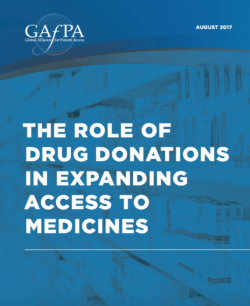GAfPA Examines How Improving Drug Donations Can Boost Patient Access
August 27, 2017
International prescription drug donation programs make a difference, explains a new white paper from the Global Alliance for Patient Access. But they could work even better.
In “The Role of Drug Donations in Expanding Access to Medicines,” author Neeraj Mistry, MD, MPH, explains that, “Millions of low-income people in countries and communities around the world depend upon the generosity of donated drugs.” And in the past few decades, donations have become better suited to fit the actual needs of patients in diverse locales.
But, as the paper points out, drug donation challenges persist. They include:
- The relevance of drugs to the context and health services
- The capacity of local workers to deliver drugs
- National registration and compliance issues
- Sorting, labeling and language barriers
- Expiration, spoiling and damage of medicines
- Supply chain management and continuity between national and state levels
- Taxes and tariffs
- Disposal costs of unusable donations.
One answer to improving drug donations and broadening their impact lies with following the example of responses to neglected tropical diseases. These are communicable diseases that run rampant in areas with poor sanitation infrastructure. International efforts have made significant strides in recent years toward addressing these diseases, due in large to proper forecasting of drug needs, partnership with pharmaceutical companies and coordinated response activities.
Another solution lies with non-governmental organizations, or NGOs. As the paper points out, these function as “an important bridge between the groups donating drugs and the groups delivering services, and ultimately, the end recipient, the patients.”
Finally, policymakers can play a role through:
- Incentivizing individual, health facility and pharmaceutical company donations.
- Supporting NGOs that facilitate donations, encouraging improvements and efficiencies.
- Raising public awareness by profiling drug donations as a successful public-private-partnership model, thereby helping to sustain development aid and encourage broader participation in drug donation programs.
Drug donations cannot substitute for health care infrastructure and dynamic market systems, the paper cautions. But policymakers can improve patient access worldwide by helping donations become more robust as part of planned, programmed health efforts.
To learn more, read “The Role of Drug Donations in Expanding Access to Medicines.”
Tags: InnovationCategorized in: Blog


